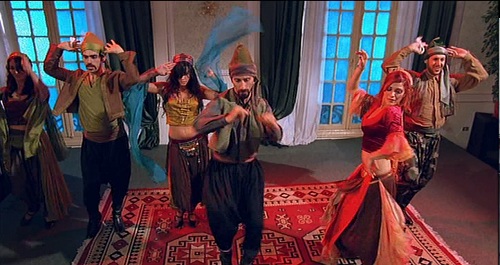By Malu Halasa,
Safar’s Writer in Residence
Few Arab musicals have ever attempted to tread the ground of Bosta, a film about the aftermath of the Lebanese civil war, exile, lost love and the generational struggle between tradition and modernity.
BOSTA
Dir: Philippe Aractingi
2005 | Lebanon

There has been a long tradition in the West with musicals, either staged or filmed, that tackle complex subjects – Chicago by Bob Fossie is about female murderers and the rise of tabloid culture; Sweeney Todd by Stephen Sondheim tells the story of serial killing and cannibalism, while The Scottsboro Boysaddresses rape and racism in 1930s America. Few Arab musicals have ever attempted to tread the ground of Bosta, a film about the aftermath of the Lebanese civil war, exile, lost love and the generational struggle between tradition and modernity.
What is remarkable about the film is that all of this takes place through the prism ofdabke, a folkloric line dance popular not only throughout the Levant but in Iraq, Turkey and the West Bank, even Israel. Philippe Aractingi’s Lebanese road movie explores the tensions between the older practitioners of the form and a younger troupe. The former advocate living and dancing in the past; the latter mix heavy Arab and electro beats with hip hop dancing. This symbolic culture clash forms the basis of this hugely popular film, which topped Lebanese box office sales for 22 weeks in 2006.
The father of the lead character Kamal Maf’ouss (played by Rodney El Haddad) ran a kind of utopian and secular Fame Academy in Beirut, and the kids in his son’s immediate class were dancers. After the civil war brutally intruded on their idyll, Kamal ends up in exile in France where he becomes a composer and choreographer. Fifteen years later he returns home to reunite his former classmates so they could perform his dream, the modernized dabke. Aggressive and physical, their version of this folkloric tradition insults the judges of the Anjar Dance Festival at an audition. On the back of this rejection, Kamal and friends commandeer his father’s old school bus (bosta) and take their dance on a tour of towns and rural villages across Lebanon.
Essentially Bosta is a road movie that tells the bittersweet stories of a generation scarred by war through the individual lives of the dancers. Much to the horror of his family, one of the troupe, Omar (Omar Rajeh), was poised to become a doctor in Germany but visa difficulties made him fall back on his one true love – dancing. Khalil (Mounir Malaeb), a Muslim who comes from a traditional village in the Bekaa Valley, has always been in love with Vola (Nada About Farhat), the woman in the troupe who has since become a star in her own right. She is a young Christian who runs through men, the same way her father ran through women. Then there is Alia (Nadine Labaki), abandoned by Kamal when he fled the country, grappling with his ambivalence and insecurities.
Each time the troupe performs, sometimes to audiences who are baffled by their modern interpretation, the dancing is dynamic. Rajeh, a real life choreographer, dancer and artistic director of Beirut’s Maqamat Dance Theatre, gives a remarkable rendition of dance as emotional catharsis for his character in the film. In his case he dances for the father who rejected him. The scene at a village wedding is joyful and full of verve in a dance-off between the Bosta crew and an elderly but dynamic, stick-wielding all-male troupe. There’s marvelous kitsch throughout, an over the top diva (played by Sabah, the Octogenarian Lebanese icon) sings about dabke, and a grateful bride takes a gift that was given to her and presents it to Alia (Labaki). Gilded, it is a decorated box with ribbons and a white bird, shorthand for ish al-asfour – “the bird’s nest”, a metaphor for women’s pubic hair that is taken straight out of the Syrian lingerie souks. Like the dancing, the songs, too, play with traditional forms of Arabic popular song, while the Afro Celt Sound System provides the heart-throbbing techno.
Labaki, who too incorporates song in her latest movie Where Do We Go Now?, said that because there was no film industry for a long time in Lebanon she was compelled to learn how to direct movies by making music videos. Bosta’s director Aractingi spent twelve years in France and directed over forty movies around the world before returning to Beirut. Bosta is his homecoming. The scenes of the Lebanese countryside from the bus and the people in the rural villages, some of whom play themselves, reveal his love of the country, a deep appreciation of the culture as well as an understanding of the frictions within wider society.
Bosta will be screening as part of Safar: A Journey Through Popular Arab Cinema at the Institute of Contemporary Arts on Friday 21 September 2012 at 8.30pm. Introduced by the director, Philippe Aractingi.
About Malu Halasa
We are delighted that London-based journalist, writer and editor, Malu Halasa will serve as a writer-in-residence forSafar: A Journey Through Popular Arab Cinema. Malu will be blogging daily at www.arabbritishcentre.org.uk and www.ica.org.uk.
Malu is a leading expert in her field, having edited books such as Kaveh Golestan: Recording the Truth in Iran (2007) and The Secret Life of Syrian Lingerie (2008). She is also Series Editor of Transit, an occasional book series showcasing new writing and images from the Middle East, includingTransit Beirut (2004) and Transit Tehran: Young Iran and Its Inspirations (2010). Former Managing Editor of the Prince Claus Fund Library, she was a founding editor of Tank magazine. She is editor-at-large for Portal 9: Stories and Critical Writing about the City, a new architectural biannual from Beirut. Most recently, Malu co-curated Culture in Defiance (2012) at the Prince Claus Fund Gallery – an exhibition that considered traditions of satire, art and the struggle for freedom in Syria.
